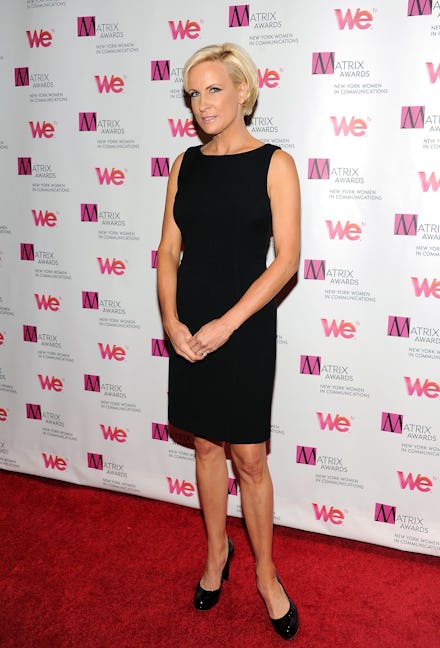Mika Brzezinski's 4 Rules for Workplace Success

Intentional or not, many approaches to creating more equitable workplaces blame women for a lack of parity. Women are told they're not leaning in enough or that they lack confidence, and their nuanced personal decisions are too often simplified to better align with gendered ideas about women in the workforce.
Mika Brzezinski is taking a difference approach. The author, journalist and Morning Joe co-host doesn't want to force American women into a rigid mold of women's leadership: She wants them to know their own value.
The problem that Brzezinski (and the women's leadership movement) seeks to address is clear: Women are vastly underrepresented in the top echelons of the business world. Though women are 59% of the college-educated, entry-level workforce and earn almost 60% of undergraduate and master's degrees, they make up only 14.6% of executive officers, 8.1% of top earners and 4.6% of Fortune 500 CEOs, according to a 2014 Center for American Progress report.
What's less clear is why this disparity persists. Though they're often excluded from the conversation, wide-spread structural barriers like unconscious bias and an institutionalized preference for men inhibit women's progress. And these are issues over which women have little control. Women can, however, learn to value themselves and to harness this confidence for success.
This belief is at the core of Brzezinski's book Knowing Your Value. As part of the tour for the book, Brzezinski intends to travel the country to teach women exactly how to implement their value for success. She offered Mic some specific insights as to how 20-somethings can get ahead of the game at the beginning of their careers.
1. Advocate for yourself.
Brzezinski notes that women often lag behind men because of self-deprecation, and not lack of tangible value. She told Mic, "After being composed, after being ferocious after being aggressive and closing a deal for their company, [women still] struggle when it comes to advocating for money, when it comes to themselves."
"It's like we look for a reason to say we're sorry. We're not."
Women are certainly capable of closing deals on behalf of their companies but "tend to apologize for everything [and] are worried about making people feel comfortable or trying to be friendly." But the words "I'm sorry," she observes, function less to make others feel better and are more accurately "a symbol of how much money we throw away." She says, "When you go into a negotiation, don't use those words. ... It's like we look for a reason to say we're sorry. We're not."
2. Learn from others' successes and mistakes.
An essential part of advocating for yourself, according to Brzezinski, is knowing how you fit into the bigger picture. "When you go into your first job, watch everything," she told Mic. "You're earning probably a lot less than you're learning in that first year. ... Watch the people who are successful, watch the people who are not."
A key to successful observation, Brzezinski adds, is paying close attention to detail. Every moment is another opportunity to learn. "Learn how to own your space, how some people own too much space and take too much oxygen out of the room, how people don't take enough," she advised. Pay attention to "how deals are effectively closed and how relationships are effectively sealed, how you answer the phone, how you say goodbye," she says.
3. Build authentic relationships
While 20-somethings are often used to the fleeting connections technology provides, women must focus on generating authentic trust in the workplace — a process that takes time and interpersonal work. "Put the phone down," she advises. "Connect over a long period of time, do good work, show you're a good person, show that you can be trusted and then things go from there."
It's this patience and longevity that will inevitably lead to key mentorship relationships that can make all the difference. Persistent and consistent connections "will be noticed," Brzezinski assures: "Good help is hard to find, and when an assistant or an intern or a page stands out, people on the upper ranks notice that and take them under their wings."
4. Trust your gut
While Brzezinski has a wildly successful career from which she can draw countless pieces of advice, at the end of the day, she admits, success is an individual process. She credits her own success in part to firmly standing by her beliefs. But doing so, she cautions, takes years of experience.
"In terms of going with your gut ... if you're in your 20s, don't worry if you don't have one yet."
Some of the watershed moments of Brzezinski's career — such as defending her integrity as a journalist and refusing to report celebrity-based news — were the result of time. "The reason why that moment was so great is that you could tell I believed what I was saying and takes decades to build on," she told Mic. "It takes decades to not only get the guts to do it but to have it in you to know to do it and to know it's the right thing."
Given that our culture often tries to dissuade women from believing in and trusting themselves, being able to do so in the context of business doesn't always come easily to women in the beginning of their careers. "In terms of going with your gut ... if you're in your 20s, don't worry if you don't have one yet," she said. "But work on getting one."
Brzezinski's tour kicks off in Philadelphia in April and will travel to Washington, D.C., Chicago, Boston and Orlando in the following months. The program hopes to impart to attendees that women's leadership and success is not a one-size-fits-all prescription, but a matter of individual confidence, self-awareness and growth.